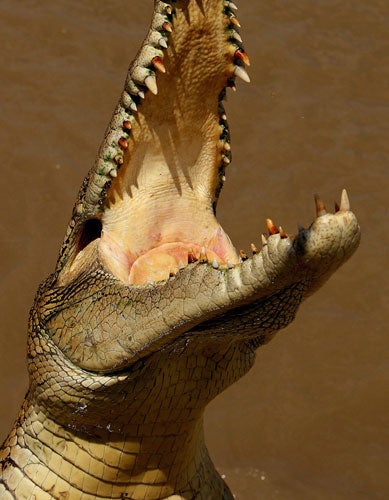Don’t kill the crocodile that killed our son, grieving parents plead

Your support helps us to tell the story
From reproductive rights to climate change to Big Tech, The Independent is on the ground when the story is developing. Whether it's investigating the financials of Elon Musk's pro-Trump PAC or producing our latest documentary, 'The A Word', which shines a light on the American women fighting for reproductive rights, we know how important it is to parse out the facts from the messaging.
At such a critical moment in US history, we need reporters on the ground. Your donation allows us to keep sending journalists to speak to both sides of the story.
The Independent is trusted by Americans across the entire political spectrum. And unlike many other quality news outlets, we choose not to lock Americans out of our reporting and analysis with paywalls. We believe quality journalism should be available to everyone, paid for by those who can afford it.
Your support makes all the difference.The remains of a five-year-old boy who disappeared in a flooded mangrove swamp more than a week ago have been found in the stomach of a 14-foot crocodile trapped nearby.
Jeremy Doble, whose father runs a crocodile-spotting tourism business in north Queensland, vanished while playing in the swamp with his seven-year-old brother, Ryan, and their boxer puppy. Ryan, who was towing Jeremy on a boogie board in waist-deep water at the time, told police he saw a crocodile shortly afterwards.
The nearby Daintree river, one of Queensland’s leading tourism destinations, is prime crocodile territory. Up to 100 mature specimens are believed to inhabit the 17-mile tidal stretch. Locals are well aware of the dangers, and it is not clear why the two boys were playing in the swamp, situated just behind the family property.
It is thought that on that fateful 8 February, Jeremy followed his dog into the river, where the crocodile was waiting. Their father, alerted by his elder son’s screams, plunged into the water but could not save the younger boy.
When a large-scale search proved fruitless, rangers laid traps and caught two crocodiles, a 10ft female and the larger male. Both were taken to Cairns where a vet examined them and X-rayed their stomach contents.
The female was released after no evidence was found to link her to the attack but the second crocodile – said to be the dominant male in the area – had Jeremy’s remains in its stomach.
Torrential rain and flooding this month have attracted more crocodiles into north Queensland’s waterways. Much of the state has been declared a disaster zone, with nearly 400,000 square miles and 3,000 homes affected. Last month the state’s Environmental Protection Agency issued a warning for people to be wary of crocodiles and to watch for other reptiles, such as snakes, turning up in houses.
Col Patterson, 44, who lives nearby, told The Courier-Mail newspaper that the reptiles were “hungry, aggressive and on the move” because the breeding season was almost over.
The male responsible for Jeremy’s death will not be euthanised but sent to a crocodile farm or zoo. The boy’s parents have specifically asked authorities not to kill the animal. However, the crocodile will not be put on public display because of its gruesome history.
The incident was the second fatal crocodile attack in the area in recent months. In September, Scottish-born Arthur Booker was eaten by a 14ft specimen while camping with his wife on the banks of the Endeavour river, near Cooktown, north of the Daintree.
Jeremy’s parents have declined to speak publicly. One Daintree resident, Keegan Penn, told The Courier-Mail the family were “numb with grief”. Mr Penn, also a tourism operator, said: “We are all saddened by it and very sorry for their loss. They are a happy family, and Jeremy was such a sweet, innocent young boy with a lovely nature.”
The number of saltwater crocodiles in Australia’s tropical waters has steadily increased since hunting was banned in 1971. Although they are a protected species, authorities are permitted to destroy individuals that threaten humans.
Since Jeremy’s disappearance, some locals have called for “an old-fashioned double-barrel croc hunt”.
Join our commenting forum
Join thought-provoking conversations, follow other Independent readers and see their replies
Comments